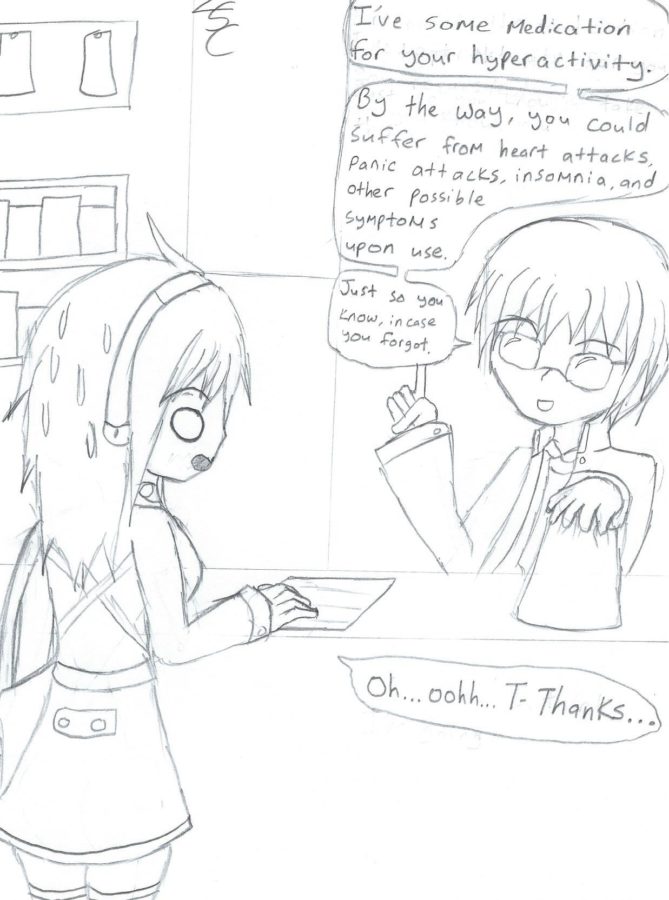The pharmaceutical industry doesn’t want the public to know there’s a range of treatments for depression, anxiety, insomnia and even muscle pain. These treatments do not require swallowing a pill or weighing your symptoms against a range of possible effects.
Pharmaceutical companies love making drugs like Xanax, Ritalin, Hydrocodone and Prozac because with FDA approval they’re viewed as thoroughly vetted and perceived to work. These companies make an enormous annual profit because most psychotropic drugs are mildly addictive, making people rely on them chemically to feel normal.
Often without them, and certainly immediately after stopping a regimen, patients are thrown into an even more drastic and confused mental state.
Our generation is developing a tainted view of drugs. In most cases, these drugs are too complex to understand at surface value. In general, it seems people overestimate the extent to which a pill can improve their life.
Yes, modern medicine is capable of incredible things, and brilliant people spent their life’s work on solutions in the past few decades that have virtually exterminated various genetic disorders and pathogenic diseases.
However, there has never been, and probably never will be, a single pill that can ameliorate any one particular symptom without also adding some sort of drawback to your general health.
Take attention deficit hyperactivity disorder. Stimulants have long been prescribed to “cure” inattentive and hyperactive individuals. Clinically, these drugs manage symptoms; however, the drawback is the grave health threats such as heart issues, panic attacks and insomnia. You may be able to focus better, but you take on three new challenges to your well-being.
I oppose beginning your journey to wellness with a visit to a psychiatrist, primarily because the pharmaceutical industry has a sinister motive: money.
Alternative treatments have zero side effects and change peoples’ lives. The pharmaceutical industry financially suppresses treatments that are kept off the market so drug companies can keep their pockets fat.
Doctors recommend these drugs because it’s easier to close a case and easy to get. Taking the low-hanging-fruit yields low-hanging-benefits. You have to put more effort into informing yourself and find treatments that are less mainstream, but just as promising.
First, there’s the Fisher Wallace Stimulator. It’s essentially a little battery-powered remote with sponge-like nodes that sit on your temples and send electrical pulses through your brain for 20 minutes. The neurons that make up our brain communicate two ways: chemically and electrically.
Common antidepressants and anxiety medications target the brain’s chemical communications. The Fisher Wallace system targets the brain’s electrical nature and stimulates brain cells to naturally produce more of the “happy chemicals” with what’s already there instead of pumping it with more chemicals that throw your brain’s natural balance off. The FDA approves this to treat depression, anxiety, insomnia and physical pain.
For people who don’t necessarily have depression but suffer from stress-induced anxiety, there are simple solutions downloadable to your phone.
One app, called “Pacifica,” allows you to manually input your mood, ranging from great to awful, and gives suggestions on how to relax. It includes guided breathing mediation, onscreen graphics and links to positive social network posts to help you be grateful for the little things.
Another similar but slightly more expensive option includes a clip-on sensor that sticks on your belt, bra or boxers to monitor breathing and activity levels to calculate your mood. It connects to your phone through an app.
When it detects stress or anxiety, it sends a little buzz to your phone that says, “Hey, you seem like you could use a break” or “Your breathing suggests you’re tense. Take a deep breath.” It encourages awareness of your mental state and use of guided meditation to take control of your mood.
Modern medicine will evolve due to the brilliance of doctors forging the field, making it less and less understandable for those seeking relief. It’s time we begin our journey to mental wellness by educating ourselves about the options doctors don’t want to mention.
Question everything and don’t lose hope. Your personal health is paramount. When seeking help, no one—not even a doctor—should rush you or oversimplify a treatment that may bring more harm than good. Remember, you deserve the best, and you deserve to be happy.



Michelle • Mar 8, 2016 at 5:15 pm
Wonderful to see a story like this in a student newspaper. High fives to you and your staff for putting it out there. As a Reiki Master I always support finding alternatives to pharmaceuticals, which, as you state, are all too often motivated by money rather than true care of the person in need. I’d like to see you write more about other alternatives such as Reiki (shameless plug), massage, herbs, essential oils, homeopathy, naturopathy, acupuncture and more. Keep up the great work!